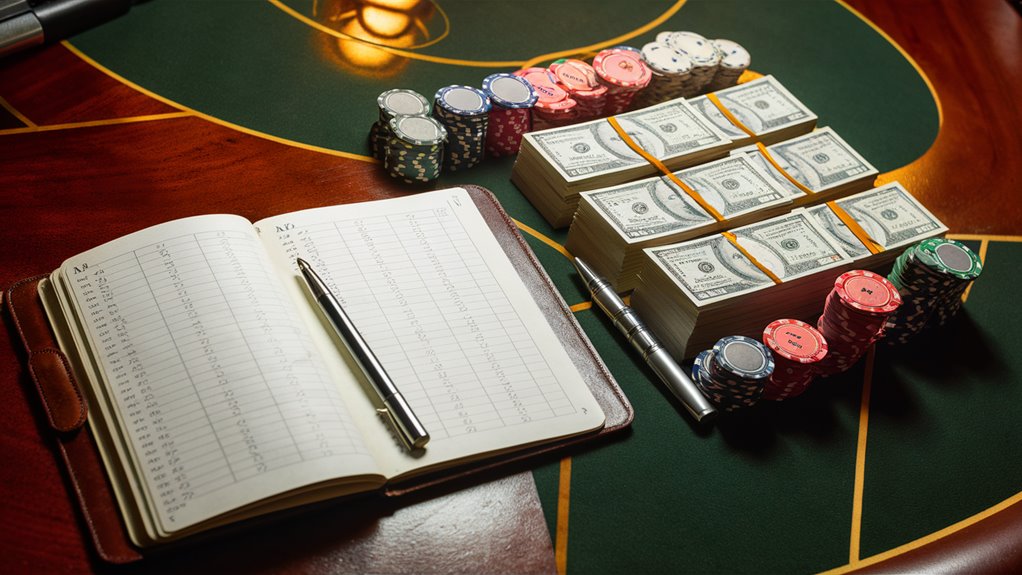Welcome to Poker Money Handling

Smart handling of money is key to good poker playing. It lets you learn and grow without losing too much. This full guide will help you gain steady poker money through well-known money rules.
Top Money Rules for Poker
Keeping poker funds apart is vital for lasting wins. Have a clear poker fund that is not mixed with your need money. If you play cash games, have at least 20-30 times your buy-in. Tournament players should have 50-100 buy-ins because it’s more up and down.
Handling Money Risk
Put strict limits on losses, at 2-3 buy-ins each time, to stop bad choices when things get hard. Never put more than 5% of your total poker money at risk in one go. This careful plan keeps your funds safe but lets you still grow your skills.
Watch and Learn
Use special software or careful lists to watch every poker game you play. Note things like:
- How much you put in
- How long you play
- Win or loss
- Big hands
- Changes in how you play
Start Small
Get the basics down at small-bet tables before you go up. Use free study spots:
- Strategy on YouTube
- Big poker groups online
- Odds tools
- Look back at old games
- Try things on free sites
These money rules build a strong base for long-term poker wins while keeping your money safe as you learn.
Must-Know Poker Words
Main Bet Words
Ante is the must bet to join a poker hand.
Blinds are bets from two players before any cards come out. It has small and big blind places.
Your stack is all chips you can bet with.
Plain Poker Moves
When it’s your turn, you can:
- Call: Match the bet
- Raise: Up the bet
- Check: Pass if no bet
- Fold: Give up your hand and money bet
Dealing Cards
Hole cards are just yours and no one sees.
The public cards show in steps:
- The flop: First three shared cards
- The turn: Fourth shared card
- The river: Fifth and last shared card
Know Hand Power
Knowing which hands beat others is key. From top to low:
- Royal Flush
- Straight Flush
- Four of a Kind
- Full House
- Flush
- Straight
- Three of a Kind
- Two Pair
- One Pair
- High Card
The pot is all money bet in a hand and what you win.
Setting Right Money Limits for Poker
Learn Money Basics
Money management is at the heart of long poker wins.
Have a clear poker fund that does not touch your living money.
For cash game players, have 20-30 times your bet.
Tournament players need more, 50-100 times, because it’s less steady.
Work Out How Much Money You Need
The money you need goes up with bet size.
If you play $1/$2 and can buy in with $200, you need $4,000-$6,000. This keeps you safe from ups and downs, letting you make the best choices when times are tough gaming psychology
Rules for Each Time You Play
Loss Limits
Set firm loss limits of 2-3 buy-ins max. This stops long losing runs and keeps your poker money healthy.
Win Goals
Have clear win goals of 3-4 buy-ins each time. Lock in your wins when you hit these targets to keep growing your poker money.
Pro Money Moves
Keeping track of results is key to good money moves.
Watch how you do and change bet sizes as needed.
Drop down if your money gets low.
Good poker paths are made from careful money steps, not big risks.
Picking the Right Bets
- Keep to buy-in rules
- Watch money ups and downs carefully
- Change bets based on how much money you have
- Keep steady when it’s tough
Choosing Good Poker Bets: A Strategic Guide

Get Money Handling Right
Picking bets wisely is key to long wins at poker.
Start with bets that let you keep 20 times your top bet in reserve. This keeps you safe from up and downs while you build skills.
Bets for New Players
Low-bet tables ($0.01/$0.02 or $0.02/$0.05) are perfect for new players. They offer:
- Nice easy games
- Low money risk
- Good spots to learn
- A way to grow without too much stress
Moving Up
Watch your game over at least 10,000 hands before going up in bets.
If you keep winning, you might be ready for bigger games.
Use the “rule of 50”: don’t play where losing 50 big bets would upset you or wreck your poker funds.
What Money You Need
Always follow strict money rules by keeping risk per session under 5% of all your money.
For $0.25/$0.50 bets, have at least $1,000. This plan:
- Keeps your cash safe
- Lets you grow your money
- Cuts stress
- Makes sure you can keep earning long-term
Watching the Key Points
Keep an eye on these when picking bets:
- How your money matches the bet
- How you handle ups and downs
- If you play better than most at that level
- If you keep winning at that rate
- 이 자료 참고하기
Free Ways to Learn Poker
Top Online Learning Spots
YouTube channels are great for learning poker.
Learning With Others
Poker groups are key for learning. They are great for deep talks on strategy and getting tips from good players.
Free odds tools, like Equilab, help you get good at odds and make smarter choices.
Hands-On Learning
Twitch.tv has changed learning. Pros show you how to play live and explain their big moves and money handling.
Trying out tracking software gives you key game facts, spotting places you can get better.
Use these tools with free game spots to build good basic skills before you play for real money.
Money Blunders New Players Make
Money Errors That Can Cost You
Handling money right is more than just learning from books.
New money handlers often make five big mistakes that can drain their cash fast:
- Putting too much into one go
- Not watching how big their bets are
- Putting more in after losing
- Not watching their results well
- Mixing up investment and need money
Must-Do Risk Plans
Start with small bets to learn while keeping your money safe.
Stick to a strict 5% max rule for any one bet, and set firm loss stop points before you start.
If you hit this loss point, quit right away, every time.
Revenge trading—bigger bets right after losses—only leads to losing more money.
Keeping Track and Keeping It Separate
Keep detailed lists including:
- When you got in and out
- How big your bets were
- How long you held
- What you earned
This info helps you see what works and what doesn’t.
Have a clear trade account away from your need money.
This split helps you make smart choices without messing with your living cash. These key rules set up good risk plans you need for long wins.


